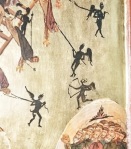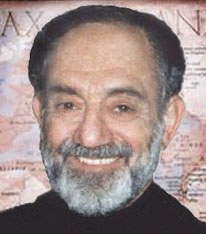Tags
Discernment, Empirical Dogmatics, illumination, Metropolitan Hierotheos of Nafpaktos, Mladostarchestvo, Noetic, Noetic Faculty, Noetic Prayer, Patristic Theology, Patristic Theology: The University Lectures, Protopresbyter John S. Romanides, Purification, Sobriety, St. Macarios the Great, Theoria, Theosis
 St. Makarios of Egypt carefully explains …Christians who do not have noetic prayer are not intrinsically different from believers in other religions. The only factor that makes such Christians different from believers of other religions is that these Christians intellectually believe in Christ and merely accept Christian doctrine, while the believers in other religions do not accept Christian doctrine. But such Christians do not gain anything from this kind of intellectual faith, because it does not heal them or purify their hearts from the [enslavement to the] passions. In terms of healing the human personality, they remain without benefit and with behavior that does not differ from that of non-Christians. This can be seen in their way of life. Purification is the first stage in the spiritual life, a stage that is also the work of the Holy Spirit. It is the Holy Spirit Who purifies, illumines, and grants theosis. It is God Who purifies, illumines, and glorifies. The teaching about purification and illumination not only defines the central task set before the catechumen, but it is also the chief duty of his spiritual father who is to open the eyes of the catechumen’s soul and to prepare him for Baptism.. In order for one’s soul to be purified of the passions, the fear of God and repentance must first be present and continue throughout the stage of purification until it is completed with divine illumination, the illumination of our nous by the grace of the Holy Spirit…
St. Makarios of Egypt carefully explains …Christians who do not have noetic prayer are not intrinsically different from believers in other religions. The only factor that makes such Christians different from believers of other religions is that these Christians intellectually believe in Christ and merely accept Christian doctrine, while the believers in other religions do not accept Christian doctrine. But such Christians do not gain anything from this kind of intellectual faith, because it does not heal them or purify their hearts from the [enslavement to the] passions. In terms of healing the human personality, they remain without benefit and with behavior that does not differ from that of non-Christians. This can be seen in their way of life. Purification is the first stage in the spiritual life, a stage that is also the work of the Holy Spirit. It is the Holy Spirit Who purifies, illumines, and grants theosis. It is God Who purifies, illumines, and glorifies. The teaching about purification and illumination not only defines the central task set before the catechumen, but it is also the chief duty of his spiritual father who is to open the eyes of the catechumen’s soul and to prepare him for Baptism.. In order for one’s soul to be purified of the passions, the fear of God and repentance must first be present and continue throughout the stage of purification until it is completed with divine illumination, the illumination of our nous by the grace of the Holy Spirit…
The passions of soul and body cannot be purified merely through knowledge. Of course, we need to know about dogma. We need to know what is written in the Bible. We need to know about prayer, and so forth. Our ability to reason can help us to weigh our decision, to determine (diakrisis) what our treatment should be, and even to decide whether or not we want to be cured. In this way, we count the costs, we determine whether the anticipated results are worth the effort, and we finally make our decision.
In the Patristic tradition — either you attain to illumination or you attain to theosis once you have already passed through illumination. Orthodox tradition is nothing other than this curative course of treatment through which the nous is purified, illumined, and eventually glorified together with the entire man, if God so wills. Therefore, is there such a thing as an illumined liberal or an illumined conservative in this context? of course not. You are either illumined or you are not. You have either reached theosis or you have not. You have either undergone this treatment, or you have not. Apart from these distinctions, there are no others. . The Fathers stress that salvation does not result automatically from Orthodox doctrine alone. Doctrine is not what saves people. It simply opens the pathway for man to reach purification and illumination. Without Orthodox dogma, however, no one can reach purification and illumination. Without an awareness and sensitivity to right doctrine, without Orthodox practice in one’s daily life, and without participation in the liturgical life of the Orthodox Church, no one can reach purification and illumination. But doctrine and liturgical life are not the means by which someone purifies his soul and reaches illumination. They are, however, the basic prerequisites and the necessary foundation that enables someone to be guided towards purification and illumination. In other words, doctrine alone does not automatically lead one to these states.. On the basis of this tradition, a spiritual father can tell when his spiritual child has passed from a state of purification to a state of illumination. Isn’t this something that a spiritual father is able to know? And how does he know it? How does a spiritual father know that their spiritual child has reached the stage of illumination? He knows it from what we have just described. So when we talk about theology based on experience, we are talking about piety based on experience, but not pietism. Theology is experiential piety. It is not just talk. It is really something quite concrete…
 Does ‘contemporary’ Orthodox theology enable us to detect a genuine doctor and to distinguish him from a quack? In other words, if we were to take a group of spiritual fathers today, would we be able to discover who is genuinely a spiritual father in a position to heal others? Or to put it differently, are we able today to spot a saint within a crowd? It seems difficult. Today, Christians have reached the point where it is difficult to separate spiritual doctors from quacks. And we have reached this position because we have replaced experiential Patristic theology with a textbook theology of dogmas that can be classified with Western theology and that does not guide the soul to purification from the passions. We have driven out the hesychastic tradition and replaced it with dogmas and morality (or moralism)…
Does ‘contemporary’ Orthodox theology enable us to detect a genuine doctor and to distinguish him from a quack? In other words, if we were to take a group of spiritual fathers today, would we be able to discover who is genuinely a spiritual father in a position to heal others? Or to put it differently, are we able today to spot a saint within a crowd? It seems difficult. Today, Christians have reached the point where it is difficult to separate spiritual doctors from quacks. And we have reached this position because we have replaced experiential Patristic theology with a textbook theology of dogmas that can be classified with Western theology and that does not guide the soul to purification from the passions. We have driven out the hesychastic tradition and replaced it with dogmas and morality (or moralism)…
God’s creative energy is not the same as His preserving energy, His purifying energy, His illumining energy, or His glorifying energy. They are not the same because, if they were the same, then all creation would participate in the glorifying energy of God. All these observations stem from the Fathers’ experience of theosis and lay the foundation for their teaching in response to the heretics. In other words, the starting point for the Patristic teaching is the ability to differentiate and observe distinctions between the energies of God. . So the history of Orthodox theology is not the history of the attempt made by certain theologians to speculate philosophically on doctrine. From an Orthodox viewpoint, someone probes more deeply into dogmas only when he uses them in his attempt to reach the stage of illumination. This is the Orthodox way to probe more deeply into the mysteries and dogmas. It is not an intellectual probing that aims at attempting to comprehend the mysteries or the dogmas or to enter their depths. Dogmas cannot be comprehended. In fact, dogmas are annulled in an experience of theosis, because they are replaced by the very living truth that they express. Dogmas are simply guides to God. When you behold God, then dogma is set aside.
—the emphatic Protopresbyter John S. Romanides
(Patristic Theology: The University Lectures)


You must be logged in to post a comment.